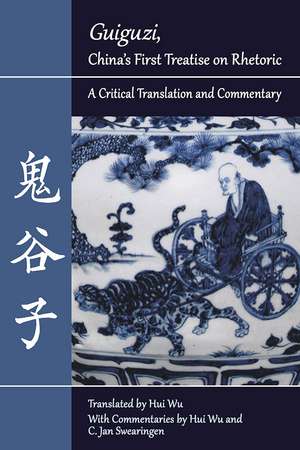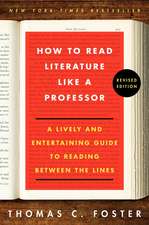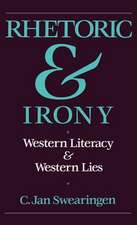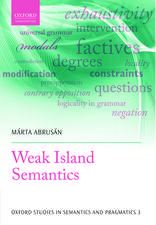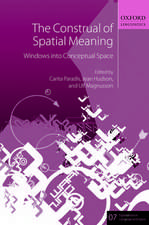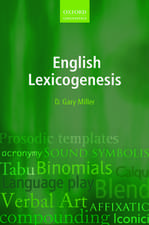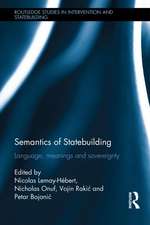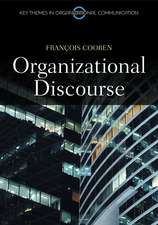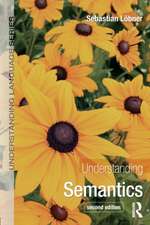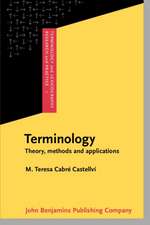"Guiguzi," China's First Treatise on Rhetoric: A Critical Translation and Commentary: Landmarks in Rhetoric and Public Address
Traducere de Hui Wu Comentarii de C. Jan Swearingenen Limba Engleză Paperback – 19 aug 2016
When Gorgias, Plato, and Aristotle were discussing and defining rhetoric in ancient Greece, many students in China, including Sun Bin, a descendent of Sun Tzu, who wrote The Art of War, were learning the techniques of persuasion from Guiguzi, “the Master of the Ghost Valley.” This pre–Qin dynasty recluse provided the basis for what is considered the earliest Chinese treatise devoted entirely to the art of persuasion. Called Guiguzi after its author, this translation of the received text provides an indigenous rhetorical theory and key persuasive strategies, some of which are still used by those involved in decision making and negotiations in China today. In “Guiguzi,” China’s First Treatise on Rhetoric, Hui Wu and C. Jan Swearingen present a new critical translation of this foundational work, which has great historical significance for the study of Chinese rhetoric and communication and yet is little known to Western readers.
Wu’s translation includes footnotes that incorporate both past and present scholarly commentary, and is accompanied by a prefatory introduction that situates Guiguzi in the sociopolitical and cultural realities of ancient China, and a glossary of rhetorical terms used in the treatise. Swearingen presents a comparative study suggesting the similarities and differences between emerging Greek and Chinese rhetorics during the same period, including the cultural contexts of warring states and emergent empires that surrounded each.
“Guiguzi,” China’s First Treatise on Rhetoric combines a new translation of a historically significant text with scholarly analysis and critical apparatus that will contribute to the emerging global understanding of Chinese rhetoric and communication.
Wu’s translation includes footnotes that incorporate both past and present scholarly commentary, and is accompanied by a prefatory introduction that situates Guiguzi in the sociopolitical and cultural realities of ancient China, and a glossary of rhetorical terms used in the treatise. Swearingen presents a comparative study suggesting the similarities and differences between emerging Greek and Chinese rhetorics during the same period, including the cultural contexts of warring states and emergent empires that surrounded each.
“Guiguzi,” China’s First Treatise on Rhetoric combines a new translation of a historically significant text with scholarly analysis and critical apparatus that will contribute to the emerging global understanding of Chinese rhetoric and communication.
Preț: 349.42 lei
Nou
Puncte Express: 524
Preț estimativ în valută:
66.87€ • 69.72$ • 55.57£
66.87€ • 69.72$ • 55.57£
Carte disponibilă
Livrare economică 27 februarie-13 martie
Preluare comenzi: 021 569.72.76
Specificații
ISBN-13: 9780809335268
ISBN-10: 0809335263
Pagini: 196
Dimensiuni: 152 x 229 x 15 mm
Greutate: 0.29 kg
Ediția:1st Edition
Editura: Southern Illinois University Press
Colecția Southern Illinois University Press
Seria Landmarks in Rhetoric and Public Address
ISBN-10: 0809335263
Pagini: 196
Dimensiuni: 152 x 229 x 15 mm
Greutate: 0.29 kg
Ediția:1st Edition
Editura: Southern Illinois University Press
Colecția Southern Illinois University Press
Seria Landmarks in Rhetoric and Public Address
Notă biografică
Hui Wu is a professor of English and the chair of the Department of Literature and Languages at the University of Texas at Tyler, and the Distinguished Guest Professor of English at Shanghai Lixin University of Commerce, China. She is the editor and translator of Once Iron Girls: Essays on Gender by Post-Mao Chinese Literary Women. Her translation into Chinese of C. Jan Swearingen’s Rhetoric and Irony: Western Literacy and Western Lies was published in 2004.
C. Jan Swearingen, a professor of English emerita at Texas A&M University, is the author of Rhetoric and Irony: Western Literacy and Western Lies, and the editor of Rhetoric, the Polis, and the Global Village. She coedited and contributed to a special symposium issue of College Composition and Communication titled “Double Trouble: Seeing Chinese Rhetoric through Its Own Lens” and has published widely on classical and religious rhetoric. She received a year-long fellowship from the National Endowment for the Humanities for her study of rhetoric and religion in colonial Virginia.
C. Jan Swearingen, a professor of English emerita at Texas A&M University, is the author of Rhetoric and Irony: Western Literacy and Western Lies, and the editor of Rhetoric, the Polis, and the Global Village. She coedited and contributed to a special symposium issue of College Composition and Communication titled “Double Trouble: Seeing Chinese Rhetoric through Its Own Lens” and has published widely on classical and religious rhetoric. She received a year-long fellowship from the National Endowment for the Humanities for her study of rhetoric and religion in colonial Virginia.
Cuprins
Contents
Acknowledgements
Redrawing the Map of Rhetoric: Introducing Guiguzi
Notes on the Translation
Guiguzi: A Critical Translation
Book I
1. Open-Shut (Bai He)
2. Reflect-Respond (Fan Ying)
3. Affect-Fortify (Nei Jiang)
4. Mend-Break (Di Xi)
Book II
5. Captivate-Capture (Fei Qian)
6. Resist-Reconcile (Wu He)
7. Weighing (Chuai)
8. Gauging (Mo)
9. Assessing (Quan)
10. Deploying (Mou)
11. Decision-Making (Jue)
12. Fundamental Principles (Fu Yan)
13. Rotation of Small Shots (Zhuan Wan)
14. Solution to Disorder (Qu Luan)
Book III
1. The Primary Doctrine on the Seven Arts of the Yin Mystique (Ben Jing Yin Fu Qi Pian)
2. Holding the Pivot (Chi Shu),
3. The Central Doctrine (Zhong Jing)
Under Western Eyes: A Comparison of Guigucian Rhetoric with the Pre-Socratics, Plato, and Aristotle
Bibliography
A Glossary of Guiguzi’s Rhetorical Terms
Acknowledgements
Redrawing the Map of Rhetoric: Introducing Guiguzi
Notes on the Translation
Guiguzi: A Critical Translation
Book I
1. Open-Shut (Bai He)
2. Reflect-Respond (Fan Ying)
3. Affect-Fortify (Nei Jiang)
4. Mend-Break (Di Xi)
Book II
5. Captivate-Capture (Fei Qian)
6. Resist-Reconcile (Wu He)
7. Weighing (Chuai)
8. Gauging (Mo)
9. Assessing (Quan)
10. Deploying (Mou)
11. Decision-Making (Jue)
12. Fundamental Principles (Fu Yan)
13. Rotation of Small Shots (Zhuan Wan)
14. Solution to Disorder (Qu Luan)
Book III
1. The Primary Doctrine on the Seven Arts of the Yin Mystique (Ben Jing Yin Fu Qi Pian)
2. Holding the Pivot (Chi Shu),
3. The Central Doctrine (Zhong Jing)
Under Western Eyes: A Comparison of Guigucian Rhetoric with the Pre-Socratics, Plato, and Aristotle
Bibliography
A Glossary of Guiguzi’s Rhetorical Terms
Recenzii
“Guiguzi is a challenging and difficult text even for native Chinese readers. Hui Wu did a fabulous job of translating it into English without losing the original meaning of the text while making it comprehensible to the English reader. Jan Swearingen’s comparative chapter sheds light on both Western and Chinese rhetorical traditions.”—Xing Lu, author of Rhetoric in Ancient China, Fifth to Third Century B.C.E.: A Comparison with Classical Greek Rhetoric
“How wonderful to have, at last, a crucial Chinese rhetoric text from the same era as Plato and Aristotle. ‘Guiguzi,’ China’s First Treatise on Rhetoric brings back to life, with careful scholarship, a foundational text and tradition. Hui Wu and C. Jan Swearingen together have wrought a work that promises to become a classic in the study of both Western and Chinese rhetoric.”—Roberta Binkley, coeditor of Ancient Non-Greek Rhetorics
“How wonderful to have, at last, a crucial Chinese rhetoric text from the same era as Plato and Aristotle. ‘Guiguzi,’ China’s First Treatise on Rhetoric brings back to life, with careful scholarship, a foundational text and tradition. Hui Wu and C. Jan Swearingen together have wrought a work that promises to become a classic in the study of both Western and Chinese rhetoric.”—Roberta Binkley, coeditor of Ancient Non-Greek Rhetorics
Descriere
This pre–Qin dynasty recluse produced what is considered the earliest Chinese treatise devoted entirely to the art of persuasion. Called Guiguzi after its author, the text provides an indigenous rhetorical theory and key persuasive strategies, some of which are still used by those involved in decision making and negotiations in China today. In “Guiguzi,” China’s First Treatise on Rhetoric, Hui Wu and C. Jan Swearingen present a new critical translation of this foundational work, which has great historical significance for the study of Chinese rhetoric and communication and yet is little known to Western readers.
